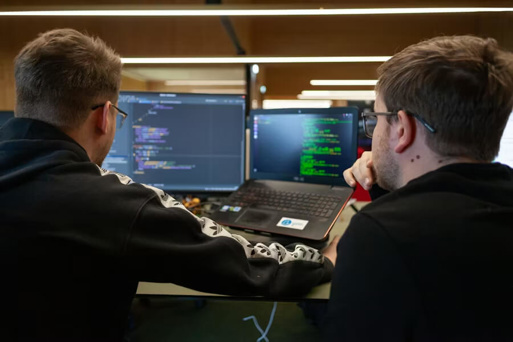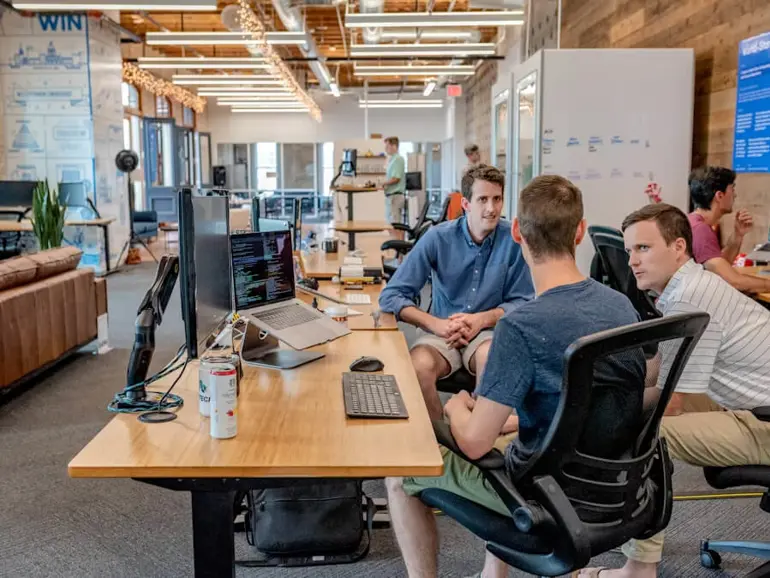What's on this page?
Jump to:
Why Soft Skills Matter in Modern Software Development
When I speak to employers, there’s a pattern that comes up so often it’s almost predictable: technical skills get someone through the door, but soft skills determine whether they can actually thrive once they’re in the team.
Hiring managers tell us the same things again and again. They want developers who can:
- communicate clearly,
- work calmly through problems,
- and collaborate without friction.
And with AI stepping in to handle more of the routine tasks, the parts of the job that rely on human judgement have become even more valuable. You still need the technical foundations, especially if you're exploring a coding career path or you're wondering how to become a Software Engineer. But the ability to explain your thinking or work with different personalities is what helps you progress.
From what I’ve seen over the years as a career advisor, the developers who grow fastest aren’t the ones who know the most frameworks. They’re the ones who ask good questions, manage expectations well, and make life easier for the people around them. That’s why these skills matter. They shape your entire career, not just your first role.
Fact: UK Tech Employers Now Prioritise Soft Skills as Much as Technical Ability
A 2025 UK study found that 74% of tech employers now value soft skills, such as communication, problem-solving, and teamwork, just as highly as technical knowledge when hiring developers.

The Essential Soft Skills Every Developer Needs
I want to say something upfront: none of these soft skills are reserved for “naturally gifted” people. I’ve watched learners from every background build them through practice, small wins, and a bit of patience. They’re the skills that make coding feel less like a solo puzzle and more like a job you can grow into. Here’s what matters most:
Problem-Solving and Structured Thinking
Every developer I’ve supported has had the same moment: the code breaks, nothing makes sense, and you have to work out why. Problem-solving isn’t about being clever; it’s about breaking things down, staying calm, and moving in small steps. In a typical day, that might mean debugging a feature, figuring out edge cases, or choosing between two imperfect options.
Communication (Written and Verbal)
Developers communicate far more than people expect. You explain your decisions, write clear comments, message teammates, and share updates with people who may not understand the technical language at all. When I ask employers what they value most, good communication is always near the top.
Collaboration and Working With Cross-Functional Teams
No matter how strong your technical foundations are, software is a team sport. You’ll work with Designers, Product Managers, QA testers, Cyber Security teams, and sometimes people you might never meet in person. I’ve seen brilliant coders struggle simply because they weren’t used to sharing work early or asking for input.
Fact: Teamwork Is the Top Soft Skill Shown on UK Tech CVs – Including Developer Roles
Analysis of UK tech CVs in 2025 found that teamwork is the most frequently listed soft skill in applications for software and coding roles. It’s a helpful reminder that your portfolio should show collaboration, not just code.

Adaptability and Continuous Learning
Tech moves fast. New frameworks, tools, and AI-driven workflows appear constantly, and that can feel overwhelming if you expect things to stay still. The developers who grow quickest are the ones who treat learning like part of the job, not something separate.
Attention to Detail
A single misplaced character can break an entire feature, and that still catches out experienced developers. Attention to detail isn’t about perfectionism; it’s about slowing down enough to check your work. On a normal day, that might mean reviewing your code carefully, double-checking instructions, or tidying up something that looks unclear.
Time Management and Prioritising Work
Coding can pull you in a hundred directions. One ticket takes longer than expected, someone needs help, and suddenly the day’s gone. Time management is what keeps you sane. In real teams, this means estimating tasks realistically, breaking work into smaller chunks, and knowing when to pause something and move on.
Role-Specific Soft Skills in Different Coding Careers
One thing I’ve learned while supporting people into tech is that “developer” isn’t one fixed personality type. Different roles ask for slightly different strengths, and recognising that early can make your learning feel far more focused.
The technical paths vary (whether you’re exploring the coding career path or looking at how to become a Software Engineer), and the soft skills shift with them.
- Front-end developers rely heavily on empathy. You’re thinking about how real people use the product, spotting where something feels confusing, and communicating those decisions clearly to Designers or Product Managers. It’s a role where listening matters just as much as building.
- Back-end developers usually lean on systems thinking. You’re dealing with logic, data flow, and scalability, which means clarity becomes essential. The best back-end specialists I’ve worked with explain complex ideas in calm, simple terms.
- If you’re drawn to Cyber Security or the Ethical Hacker path, curiosity and risk awareness take centre stage. You need the persistence to test, probe, and keep going when something doesn’t behave as expected.Full-stack developers blend all of the above but add one more ability: switching contexts without losing momentum. You might shift from a UI tweak to an API fix in the same afternoon, and that flexibility is a skill in itself.
Knowing where you’re heading helps you build the right habits early.

How to Build These Skills Before You Get Your First Developer Job
You don’t need a full-time role to start building these skills. In fact, most of the learners I support grow them long before their first interview.
The simplest place to begin is with small portfolio projects. When you build something from scratch, you practise problem-solving, attention to detail, and communicating your decisions, even if you’re only explaining them to yourself at first.
Hackathons, pair programming sessions, and online communities are also brilliant training grounds. I’ve seen beginners gain more confidence in one weekend event than in months of solo learning. When you work with others, you naturally develop collaboration, communication, and the ability to adapt when things change.
If you want a practical habit to start today, try narrating your decisions out loud while you code. It feels strange at first, but it sharpens your thinking and makes interviews easier later.
Writing basic documentation (even a simple README) also goes a long way. Employers love candidates who take clarity seriously.
And if you have the chance to volunteer on a small project or take on a tiny freelance task, do it. Real users teach you skills tutorials can’t. If you’d like more structure while you build these habits, our coding courses offer guided practice that mirrors real working environments.
Final Thoughts and Next Steps
Whenever I’m talking with learners who are just starting out, there’s often a moment when everything clicks: they realise soft skills aren’t something you either have or don’t. They’re shaped through practice, small projects, honest conversations, and showing up consistently. And the good news is that every one of these skills grows faster than people expect once they start using them intentionally.
If you’re ready to move towards a career in development, there are clear paths you can follow and plenty of support available. We can help you build the technical foundations, strengthen the soft skills that employers look for, and map out your next steps with confidence.
Book a free career consultation with one of our advisors today for personalised support; simply hit the button below to get started.




